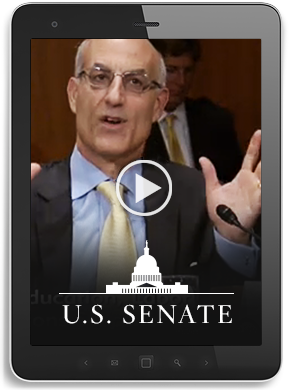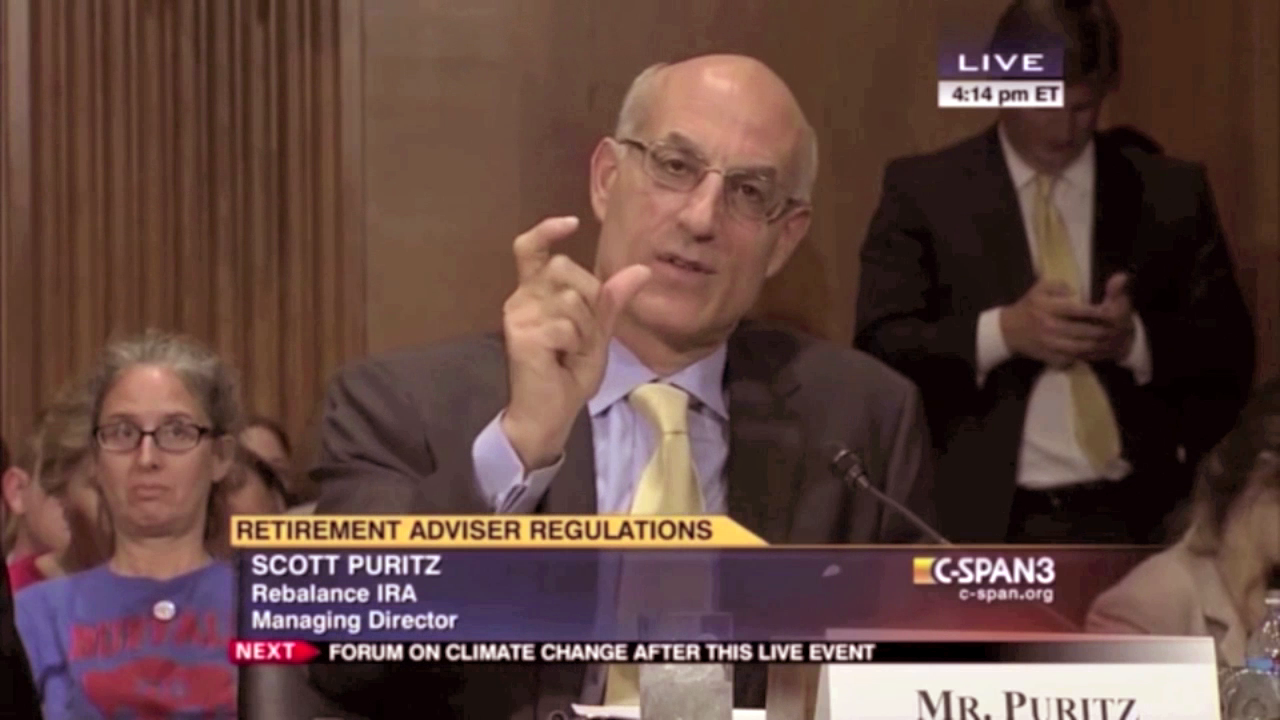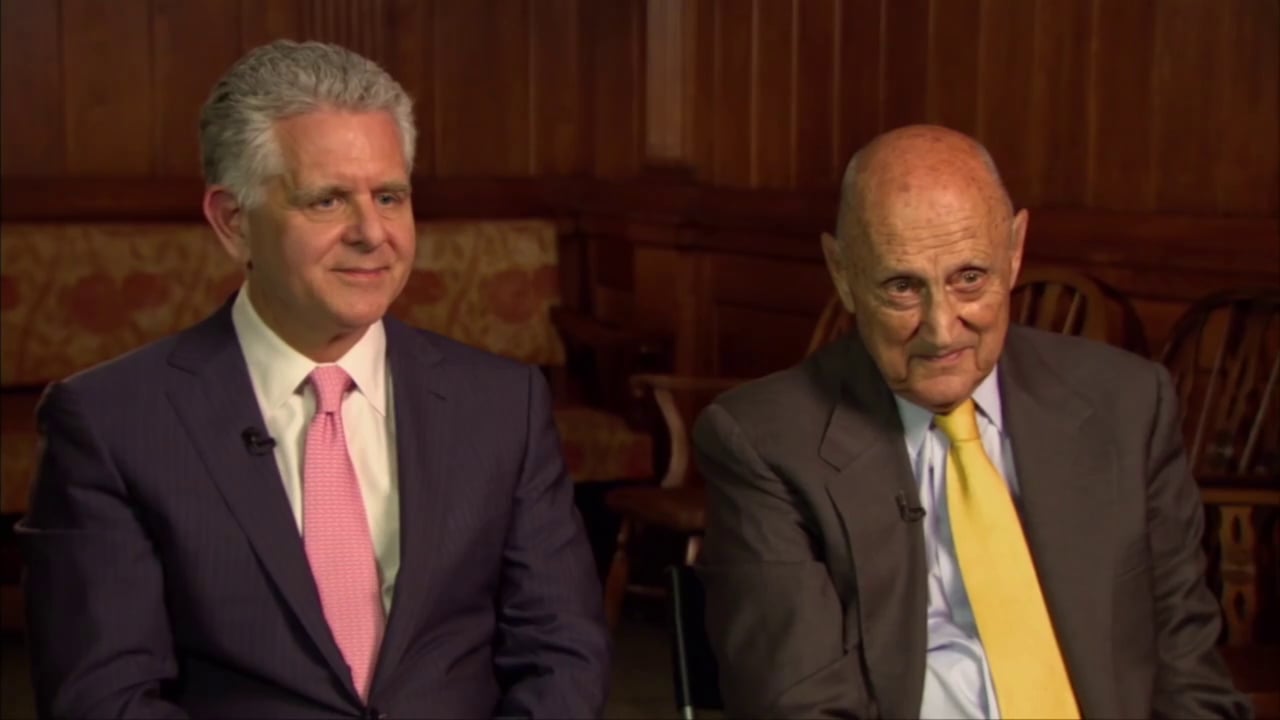Transcript
Recently, the U.S. Senate held hearings on a new rule to make retirement investment safer for all Americans. This proposed rule requires financial advisors to act in the best interest of their clients and to disclose the real cost of the investments they recommend, meeting what is called a fiduciary standard.
Rebalance co-founder Scott Puritz was asked to provide the Senate with expert testimony on the subject. Also appearing before the Senate was Peter Schneider, President of Primerica, a company that distributes financial products to middle-income Americans and opposes the new rule. Senator Elizabeth Warren of Massachusetts asked Schneider about a recent lawsuit involving Primerica and the retirement accounts of 238 firefighters and other public workers in Florida. She then asked Puritz for his perspective.
Senator Elizabeth Warren: Mr. Schneider, you’re the CEO of Primerica, a large investment advisory firm, and you’ve testified today that the Department of Labor’s rule is, and I think these are your words, “complex and burdensome,” and you’ve said that one thing that’s “critical to your success” is that Primerica always operates in its clients’ best interest. So I was interested to read a news report this morning that outlines lawsuits brought against your advisors in Florida.
According to the article, at least 238 firefighters, teachers and other career public workers who were near retirement age accused your company of providing bad advice that drained their retirement savings. And you did it by advising them to move their retirement savings out of a guaranteed government pension into riskier private investments. Now, Primerica was poised to make a lot of money, but only if you could convince Florida firefighters who were near retirement age to cash out their guaranteed pensions. So Mr. Schneider, I just want to understand your company’s advice in these cases. Do you believe that people like these firefighters from Florida, who are near retirement and have secure pensions with guaranteed monthly payments, should move their money into riskier assets with no guarantees just before they retire?
Mr. Schneider: First of all Senator Warren, I appreciate the promotion. I’m actually the president of the company, not the CEO. I’m familiar with the matter of which you speak, and it doesn’t have any application actually to the rule before the committee, because in that particular case none of those individuals were actually clients of Primerica. They paid us no compensation…
Senator Elizabeth Warren: Let’s stop right there, Mr. Schneider. The article didn’t say that the workers were your retirement clients. It says you gave them bad advice. And here exactly is the quote: “Once these workers retired and moved out of their government plans, Primerica agents stood to profit for managing their retirement assets. Had they stayed in the pension programs, retirees would have simply collected their monthly payments, leaving nothing for Primerica to manage and no commissions for Primerica agents to harvest.” Now, my question is not how you were paid. My question is whether you think it is sound investment advice to encourage public employees to move their money out of their pensions and into riskier assets with no guarantees just before they retire?
Mr. Schneider: So, Senator, in that particular matter, first of all, regulators looked at that. They found that the firm had acted properly…
Senator Elizabeth Warren: I’m going to stop you right there. The question about the regulators is the question is it even legal to do that and that’s exactly the problem we’ve got. It is legal to do that and that’s what the regulators say, it’s legal. My question, once again, is about the advice that Primerica agents gave. Is it a good idea for firefighters on the front edge of retirement to move out of a guaranteed benefit plan that was going to cover them for all their lives and move into a risky investment that would make a lot of fees for your agents?
Mr. Schneider: You know, each situation is really very different. If you are in a defined benefit plan and you’re sick, what happens is, in the state of Florida for example, were you to retire and then die two or three weeks later, you had no ability to leave your money to your loved ones.
Senator Elizabeth Warren: I’m sorry, are you suggesting that these 238 people were weeks away from dying and that’s why they all got this advice?
Mr. Schneider: Well, Senator, the courts dismissed those cases, and frankly…
Senator Elizabeth Warren: Because it is a legal activity. I think we’ve established that Mr. Schneider, that no one broke the law. The question is whether the law should be changed.
Mr. Schneider: It illustrates one of the issues, though, with the rule, because we’re here to talk about the rule. And one problem with the rule is, as everyone in the financial services industry knows, especially after the financial crisis, you can be sued, sometimes appropriately but also sometimes frivolously. And under the best interest contract exemption, you’ve entered into a contract with the client and they can sue you and you can lose the benefit of the exemption…
Senator Elizabeth Warren: I understand Mr. Schneider that you don’t want to be sued. I totally get that, but the question I keep trying to ask is whether it’s generally a good idea for workers like firefighters and teachers on the eve of their retirement to move their money from guaranteed defined benefit plans into riskier investments.
So let me ask you that question Mr. Puritz. You’re the Managing Director of Rebalance. You have a large investment management firm. Would you advise 50-year-old, 60-year-old clients to cash out of a defined benefit pension plan and move money into an IRA managed by your company?
Mr. Puritz: As a general rule, the answer is no.
Senator Elizabeth Warren: Okay, so you’d say no. Why not?
Mr. Puritz: In a traditional pension or defined benefit plan, there’s safety and predictability. My answer would be different if it was a defined contribution plan.
Senator Elizabeth Warren: But that’s not what we have here. We have a defined benefit plan that guarantees that these people are going to be covered for their entire lives. Is that right? So, there’s a lot of research around this, I understand. Are there circumstances in which it is a good idea for somebody right on the threshold of retirement to move from a defined benefit plan that will protect them for the rest of their lives to a much riskier plan?
Mr. Puritz: There are circumstances, but they’re very rare.
Senator Elizabeth Warren: Well, I’m going to say, I took a look at the research on this and wanted to get some more experts’ opinions on this, and it seems to me the research is pretty clear. Alicia Munnell, the director of the Center for Retirement Research at Boston College has said, and I’ll quote her, “Only those with serious illnesses who believe that they do not have much time left, should even consider cashing out a defined benefit pension and even that isn’t obvious because,” as she puts it, “even sick people might live longer than they think.” So Mr. Puritz, let me ask you one more question. Do you think it is, and I want to use the correct quote here, “complex and burdensome” to offer advice that is in the best interests of the client, as Primerica claims?
Mr. Puritz: The answer is no.
Senator Elizabeth Warren: I didn’t think so. So, frankly, the suggestion that it’s too expensive to provide people with sound financial advice is ridiculous. Millions of financial advisors do it every day. Hardworking Americans like the Florida firefighters and teachers, who devoted their careers to protecting the public and who were targeted by Primerica, shouldn’t have to worry about whether their financial advisors are planning to get rich by playing roulette with their customers’ retirement savings. Hardworking advisors like Mr. Puritz shouldn’t have to compete with these schemes. I am glad the Department of Labor is working to fix this problem. Thank you, Mr. Chairman.
The Department of Labor’s new rule is designed to save investors billions of dollars they lose each year due to conflicted investment advice. One way to avoid that risk right now is to make sure your advisor is a registered fiduciary.







